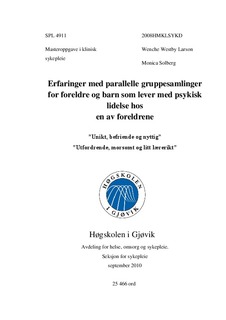Erfaringer med parallelle gruppesamlinger for foreldre og barn som lever med psykisk lidelse hos en av foreldrene
Master thesis
Permanent lenke
http://hdl.handle.net/11250/143701Utgivelsesdato
2010Metadata
Vis full innførselSamlinger
Sammendrag
NORSK: Sosial- og helsedirektoratet skriver i sin tiltaksplan (Sosial- og helsedirektoratet 2006) at perspektivet må utvides innenfor psykisk helsevern for voksne: ”praksis må endres fra en individorientering til et utvidet klientbegrep som omfatter familie og nettverk som viktige i behandlingen av den syke”.
Hensikten med denne studien var å beskrive foreldre og barns oppfatninger og erfaringer ved å delta i parallelle gruppesamlinger, hvorav en av foreldrene har en psykisk lidelse.
En kvalitativ eksplorerende deskriptiv design med en fenomenografisk tilnærming av foreldrepar intervjuene, og kvalitativ innholdsanalyse i fokusgruppeintervjuene ble benyttet. Fire foreldrepar og fire barn ble intervjuet to ganger. Barna var i alderen 8 – 12 år.
I analysen av foreldrepar intervjuene framkom fire beskrivelseskategorier: Gruppesamlingene var unike, befriende og nyttig, Dele erfaringer, Tydeliggjøring av posisjoner og roller og Oppdage lære og erkjenne. I analysen av fokusgruppeintervjuene framkom ett tema Gruppesamlingene var utfordrende, morsomme og litt lærerike og tre kategorier: Nye erfaringer i møte ned andre, Endret mening og holdning til deltakelse og Ny forståelse for psykiske lidelser.
Funn i denne studien kan bidra til økt forståelse og økt fokus på betydningen av at hele familien inkluderes i behandlingen av forelderen med psykisk lidelse. ENGELSK: In their Implementation Plan (Directorate of Health, 2006), the Norwegian Directorate of Health points out that the perspective of mental health care for adults must be expanded, “the practice must be shifted from the individual-oriented client concept towards an expanded patient concept encompassing family and networks as being important for the treatment of the patient.”
The aim of this study was to describe the opinions and experiences of parents and children participating in parallel group sessions, in which one of the parents is subject to mental suffering.
A qualitative exploring and descriptive design with a phenomenographic approach to the pairs of parents interviewed has been employed, as well as a qualitative content analysis in the focus interviews. Four pairs of parents and four children were interviewed. The children were aged 8 to 12.
Four descriptive categories emerged in our analysis of the interviews with the pairs of parents: The group sessions were unique, liberating and helpful; shared experiences; the clarification of positions and roles; and exploring, learning and acknowledging. A particular theme emerged through our analysis of the interviews with the focus groups: The group sessions were challenging, enjoyable, and quite instructive. Three categories of description emerged, as well: New experiences through meeting other people; a changed opinion of, and attitude to, participation; and a new understanding of mental suffering.
We believe that the results of / discoveries made in this study may lead to a better understanding of, and a sharper focus on, the importance / value of involving the whole family in the treatment of the parent who is suffering from a mental suffering.
